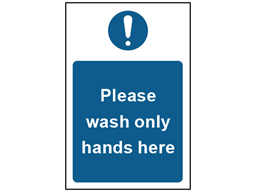
For anyone who had ever suffered from food poisoning, you know exactly how important food hygiene (and food hygiene signs) are. When unhygienic mistakes are made in the kitchen, people can become dangerously sick. Therefore, it is paramount to always take the proper precautions to ensure hygiene is being taken seriously. It can also land companies in hot water, as breaking food hygiene laws can be met with a serious fine.
Of course, you hope whoever is preparing food is fully aware of the food hygiene regulations (which you can read more about here) but having food hygiene signs can be a great reminder. These food hygiene signs are used to remind people to wash their hands, wear appropriate clothing and how the kitchen is organised to promote food safety. Not only are they great for the team, they're especially good for new staff who may not yet be accustomed to food hygiene rules.
We have a wide range of food hygiene sings here at Label Source - view our whole collection of kitchen safety signs here. Here's a look at just a few in the collection:

No one wants hair in their food! Make sure you remind staff to wear a hair net with this useful food hygiene sign.

Cross-contamination between raw and cooked food can make people seriously ill. Make your dedicated areas clear with this 'raw food preparation' food hygiene sign.

You must have a sink in a professional kitchen that is only for washing hands. Make sure it's clear which one this is with this 'Wash Hands Only' food hygiene sign.
If you have any questions about our food hygiene signs or any other the other signs we supply then feel free to get in touch. Our friendly team is always here to help so contact us today.
We share a lot of health and safety stories on this blog, many of which focus on the news that yet another organisation has been prosecuted and fined for poor safety practices. More often than not, these law-breaking companies are in high-risk fields like construction and industrial manufacturing, and they're caught out because a worker suffered an injury (or worse) that would have been prevented had the proper regulations been observed.
Today, however, we'd like to share a news story which demonstrates that every company in every industry must abide by the rules or face the consequences. Earlier this week, The Enquirer reported that a business in Essex had been fined £20,000 for a number of unsafe practices. So what type of business was this? An engineering firm? A large factory?
No and no; in actual fact, it was the Crown Café in Southend-on-Sea. Last week, Southend Magistrates Court found the business guilty of the following food hygiene / health and safety breaches:
- No wash basin exclusively designated for hand washing in the kitchen
- No documented food safety management system
- Failure to maintain electrical installations in the café
These issues were documented during an inspection of the café in August 2015. Inspectors issues three Improvement Notices, but a follow-up inspection one year later found that the Notices had not been acted upon and that the problems were still there. As a result, Ms De'Ath was ordered to pay £1,440 (plus £1,000 in costs), and the business itself was fined £16,000 (plus £2,162.50 in costs). On top of that, Ms De'Ath and her business had to pay a victim surcharge totalling £188.
After the sentence had been delivered, a local councillor made the following statement:
"We hope this successful prosecution sends out a clear message to food businesses that you must take your responsibilities for food hygiene and health and safety seriously...we will take any action necessary to protect the public from harm."
Health and safety is a crucial concern for all organisations across all sectors. No matter what products or services you provide, it is your responsibility as a business owner to carry out a full risk assessment and take any measures necessary to minimise the risk that someone will come to harm on your premises or as a result of your operations. If you work in the food industry, then hygiene should of course be a key priority, but you are also bound by the same general health and safety legislation as any other commercial organisation. Don't let yourself end up in court like the owner of the Crown Café!
Here at Label Source, we stock a number of signs and notices to help promote hygiene and safety in a kitchen environment. Click here to browse our Kitchen Safety Signs range.
A few days ago the BBC reported that Berlin's innovative 'public fridges' were at risk of being closed, due to health and safety concerns. The fridges are indented to lower food waste and provide nourishment for the homeless, by allowing people to leave leftovers and unused food that would otherwise go to waste. While this sounds like a fantastic and progressive idea, there have been some concerns regarding health and safety which could cause the fridges to shut for good.
Local food safety authorities were not pleased by the hygiene standards of some of the fridges, stating that unpackaged and partially torn items were unhygienic, and suggesting that the fridges should be classed as food businesses. The organisers of course insisted that their fridges had never posed a health risk, angered by the suggestion that their project is putting public lives at risk. Fears that the fridges will have to close as a result of these comments has sparked an online petition, in which thousands have expressed their support for the scheme and its continuation.
While we are usually in support of any campaign which intends to improve awareness of food hygiene and public safety, it seems ridiculous to attack a scheme that not only prevents food waste, but also provides the needy with a nutritious portion of food. In many cases, it's likely that the most desperate members of this community would turn to even more unhygienic methods to retrieve food during their lowest points, so isn't it better to provide them with a service which is monitored than to leave them to their own devices?
Although we can't fault the inspectors for raising concerns, their efforts would be better spent in working with the program organisers as opposed to against them. This way, they could organise regular checks and tests of the fridges, and ensure that the proper food safety guidelines were being used and adhered to. If schemes like this are to continue and become more widespread, it's vital that health and safety professionals work alongside coordinators to make the programme both safe and successful.
For more health and safety news, follow us on Facebook and Twitter.